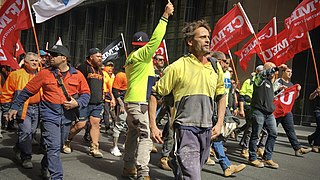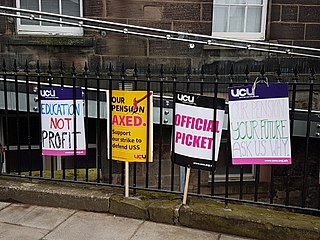The 30 November 2011 UK Public Sector Pensions Strikes were a series of strikes over the whole of the United Kingdom. 60% of schools in England were closed and 6,000 hospital operations cancelled as up to two million public sector workers went on strike. [1]
The strike actions resulted in disruption of services including
The Department for Education said 58% of 21,700 state schools in England were closed, with 13% of these partially shut down. In Scotland just 30 of the 2,700 council run schools remained open. In Wales around 80% were believed shut and in Northern Ireland more than 50% of 1,200 schools were closed.
In the health sector, NHS managers estimated that some 6,000 out of 30,000 routine operations had been cancelled throughout the UK, as well as tens of thousands of appointments. London Ambulance Service told the BBC that it was struggling and people not in a life-threatening condition might not get an ambulance.
The strike saw walkouts by tens of thousands of border agency staff, probation officers, radiographers, librarians, job centre staff, court staff, social workers, refuse collectors, midwives, road sweepers, cleaners, school meals staff, paramedics, tax inspectors, customs officers, passport office staff, police civilian staff, driving test examiners, patent officers and health and safety inspectors.
In Wales unions reported around 170,000 workers on strike, and in Scotland around 300,000.
Up to 1,000 marches and rallies took place across the UK. Four arrests were made ahead of the national rally in London, two for assaulting an officer and two for possession of a weapon.
UK Prime Minister David Cameron said that the strike was a "damp squib", with many key services continuing to operate. The government claimed that the turnout was "much lower" than the two million claimed by the unions. [2] On The One Show, BBC presenter Jeremy Clarkson expressed his pleasure at the strikes leaving the roads empty, and claimed that he would kill the striking workers. "I would have them all shot", he said. "I would take them outside and execute them in front of their families". The One Show apologised at the end of the show to viewers who may have been offended by Jeremy Clarkson's comments. [3]
YouGov reported that 40% of British people supported teachers going on strike and 49% opposed it. Figures were similar for civil servants striking, with 38% in support and 50% in opposition. [4]

The 2002–2003 UK firefighter dispute was a period of nationwide strike action which began when the Fire Brigades Union (FBU) voted to strike in an attempt to secure better salaries. The FBU demanded a 39 percent increase in pay, which would have brought the average firefighter's wage to around £30,000. It balloted its members for a strike in late 2002 and the industrial action began in November. It was the first nationwide firefighters' strike in the UK since 1977. The strike was led by FBU General Secretary Andy Gilchrist.

Strike action, also called labor strike, labour strike in British English, or simply strike, is a work stoppage caused by the mass refusal of employees to work. A strike usually takes place in response to employee grievances. Strikes became common during the Industrial Revolution, when mass labor became important in factories and mines. As striking became a more common practice, governments were often pushed to act. When government intervention occurred, it was rarely neutral or amicable. Early strikes were often deemed unlawful conspiracies or anti-competitive cartel action and many were subject to massive legal repression by state police, federal military power, and federal courts. Many Western nations legalized striking under certain conditions in the late 19th and early 20th centuries.

The Public and Commercial Services Union (PCS) is the eighth largest trade union in the United Kingdom. Most of its members work in UK government departments and other public bodies.

The Norfolk and Norwich University Hospital (NNUH) is a large National Health Service (NHS) academic teaching hospital in the Norwich Research Park on the western outskirts of Norwich, England.
The POA: The Professional Trades Union for Prison, Correctional and Secure Psychiatric Workers, also known as the Prison Officers' Association (POA), is a trade union in the United Kingdom. It currently has a membership over 30,000.

The Burston Strike School was founded as a consequence of a school strike and became the centre of the longest running strike in British history, that lasted from 1914 to 1939 in the village of Burston in Norfolk, England. Today, the building stands as a museum to the strike. Every year hundreds of people turn up for a rally to commemorate the 25-year strike of Annie and Tom Higdon.
The 1993 DundeeTimex strike was a major industrial dispute which took place in Dundee, Scotland, in 1993. The dispute, which was notable for its level of picket-line violence and the involvement of women, ended with the closure of the Timex plant in the city after 47 years. It is considered by historians to be the last of the large industrial disputes of late 20th century Britain.

Emergency medical services in the United Kingdom provide emergency care to people with acute illness or injury and are predominantly provided free at the point of use by the four National Health Services (NHS) of England, Scotland, Wales, and Northern Ireland. Emergency care including ambulance and emergency department treatment is only free to UK residents and a charge may be made to those not entitled to free NHS care.
In Chile, workers have the right to form and join unions without prior authorization, and approximately 10% of the total work force is unionized.

A key worker is a worker in an occupation given preferential treatment by government policy. They may be exempted from rules which apply to the general population or prioritized for the receipt of benefits.

The East Midlands Ambulance Service NHS Trust (EMAS) provides emergency medical services, urgent care and patient transport services for the 4.8 million people within the East Midlands region of the UK - covering Nottinghamshire, Derbyshire, Leicestershire, Rutland, Lincolnshire and Northamptonshire. It was formed in 1999 by amalgamating several county ambulance services, and in July 2006 was dissolved and reformed under the same name as part of a nationwide reorganisation of ambulance service provision.

The anti-austerity movement in the United Kingdom saw major demonstrations throughout the 2010s in response to Conservative-Liberal Democrat coalition government's austerity measures which saw significant reductions in local council budgets, increasing of university tuition fees and reduction of public spending on welfare, education, health and policing, among others. Anti-austerity protests became a prominent part of popular demonstrations across the 2010s, particularly the first half of the decade.
The J30 Protests were a one-day strike held in the United Kingdom on 30 June 2011. The strike was held by public sector workers in an effort to protest the government's planned unconventional changes to pension plans and retirement policies, including raising the retirement age from 60 to 66 and the replacing of final salary pension schemes with a career-average system. The Driving Standards Agency had recently announced that it was to launch a localised trial to determine whether delivering examiners from non-established test centres could help with growing pupil demand, starting in Warrington, Wiltshire, Ayrshire, Wales and Dumbarton.

From 2018 to 2023, the UK university sector faced an industrial dispute between staff, represented most often by the University and College Union (UCU), and their employers, represented by Universities UK (UUK) and the Universities and Colleges Employers Association (UCEA). The dispute was initially over proposed changes to the Universities Superannuation Scheme (USS), a pension scheme. The changes would have seen a significant drop in worker compensation, and in response the sector experienced industrial action on a scale not before seen. Pay equality, workload, casualisation, and pay levels were added to the dispute in 2019. Action was curtailed by the onset of the COVID-19 pandemic in the United Kingdom, but resumed in 2021. By March 2023 a resolution had been reached on the USS, which returned to 2017 terms in a victory for the UCU. The UCU was however not successful on The Four Fights, as a November 2023 ballot for extending action failed on turnout. Many universities faced mass redundancies in 2024 amid declining funding.

The 2019 Chicago Public Schools strike was a labor dispute between Chicago Public Schools and the Chicago Teachers Union and the Service Employees International Union Local 73 that lasted 14 days. The strike began on October 17, 2019, when both unions failed to reach a contract agreement with Chicago Public Schools over compensation, benefits, staffing, wrap-around services such as counselors, nurses, and librarians, and caps on class sizes. On October 31, the strike officially ended when the mayor and the Chicago Teachers Union reached a tentative agreement allowing students to go back to class on November 1, 2019. The agreement included millions of dollars dedicated to reducing class sizes, hundreds more social workers, nurses and librarians, and a 16 percent salary increase over the coming five years, but did not achieve all the main goals of the unions.
The 2022–2024 United Kingdom railway strikes were an industrial dispute between rail workers and companies, with the latter supported by the UK government. The rail workers are represented by several unions including the National Union of Rail, Maritime and Transport Workers (RMT) and the Associated Society of Locomotive Engineers and Firemen (ASLEF). The railway strikes commenced on 21 June 2022 after workers walked out over wages, planned changes to working practices – involving the removal of guards from trains, the reduction in the number of open ticket offices, and an increase in the age at which people could claim the young persons and senior citizen card – and the threat of redundancies. The industrial action was the largest in the sector since 1989, and involved 40,000 workers nationwide.

The Trade Union (Wales) Act 2017 is an Act of the National Assembly for Wales governing trade union activity in the public sector in Wales. Chiefly it prevents the use of agency workers during strike action in services that belong to the public sector, as well as overturning a 40% support threshold for strike ballots, restrictions affecting time off for union activities and the taking of union subscriptions directly from pay packets. At the time it was approved in July 2017, Mark Drakeford, Cabinet Secretary for Finance praised the Act as "a very significant day" for public services and devolution.
Since May–June 2022, a series of labour strikes and industrial disputes have occurred in various industries of the United Kingdom's economy as workers walked out over pay and conditions. The strikes took place with rising inflation, and demands for pay increases that would keep pace with this inflation.

Starting in May 2022, postal workers in the United Kingdom undertook a series of strikes and industrial disputes. They principally involved members of Unite and the Communication Workers Union (CWU) at both Royal Mail and the Post Office. The Royal Mail strikes ended in July 2023 after workers agreed to a three-year pay deal with Royal Mail.

The 2022–present National Health Service (NHS) strikes are several ongoing industrial disputes in the publicly funded health services of the United Kingdom.